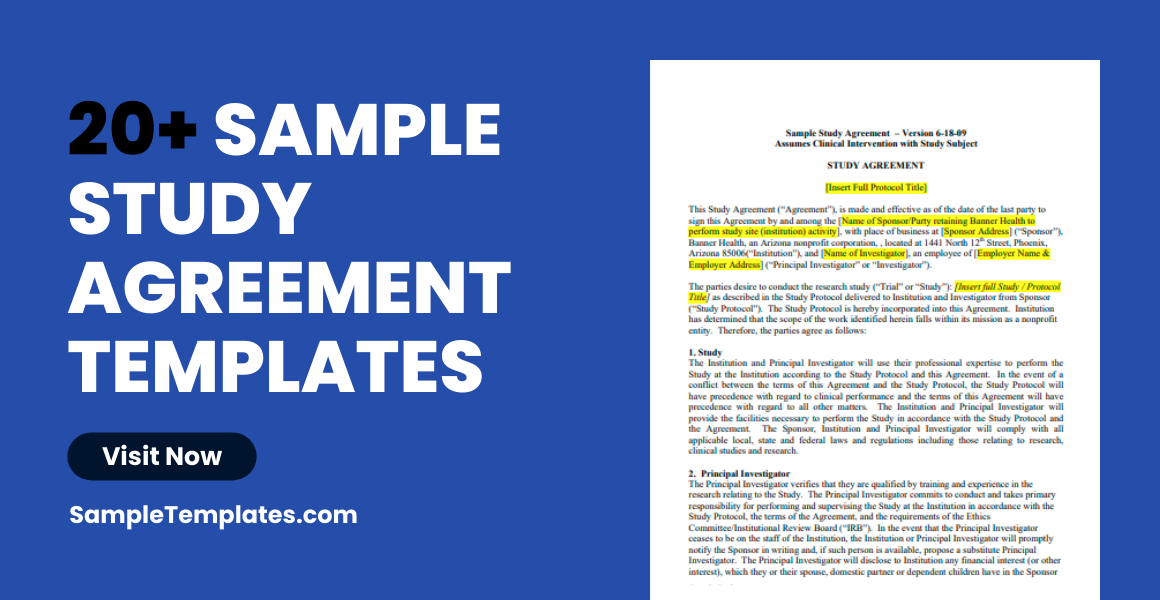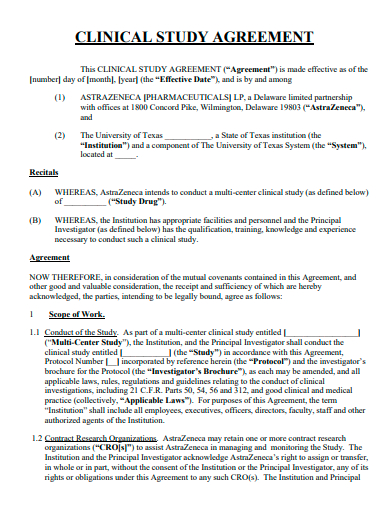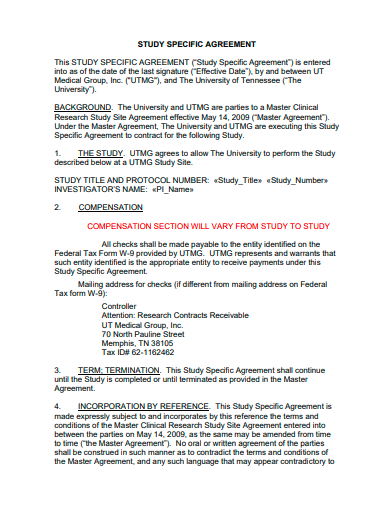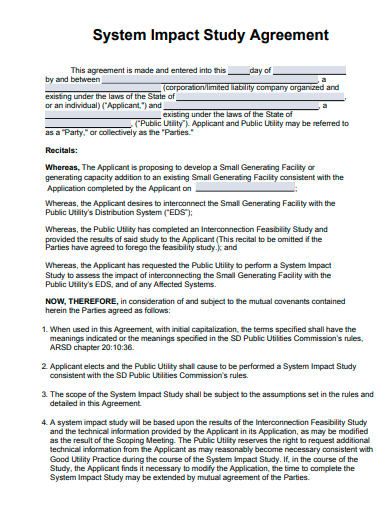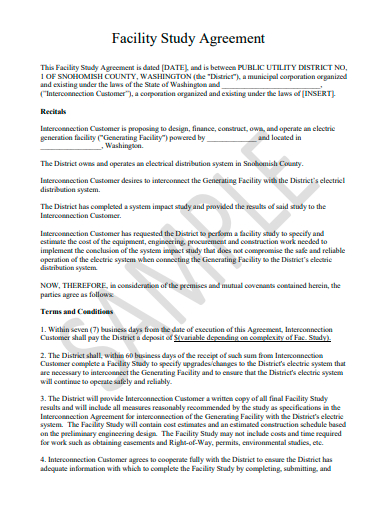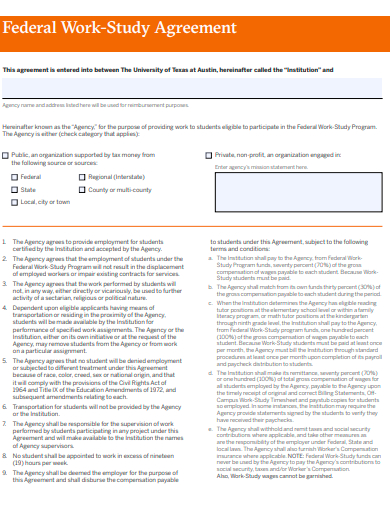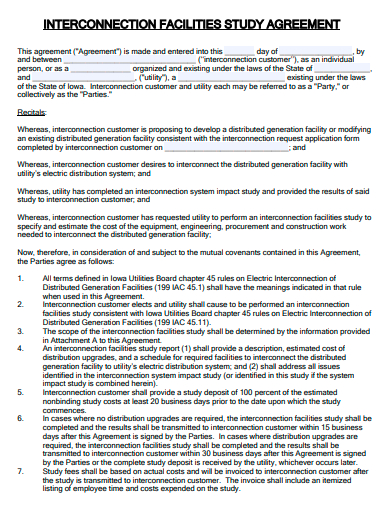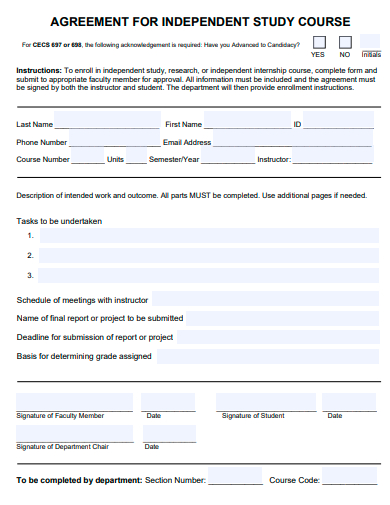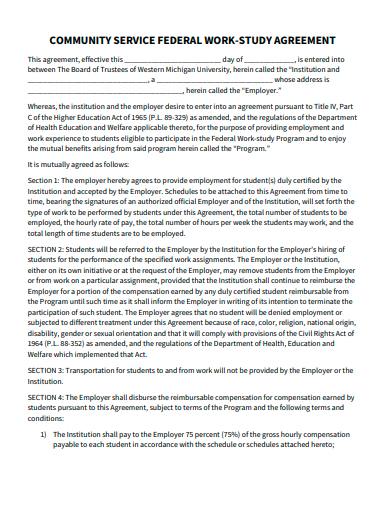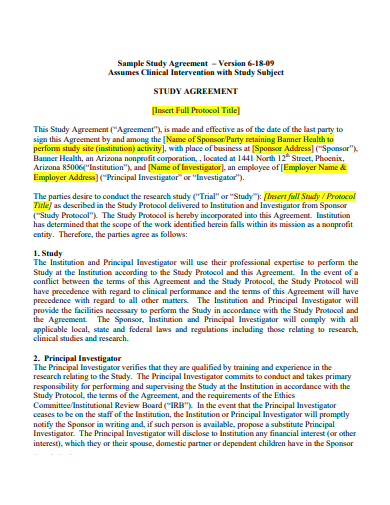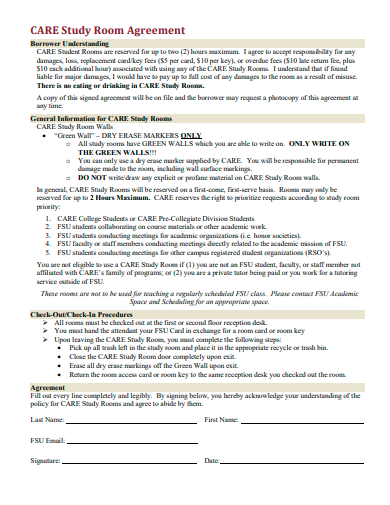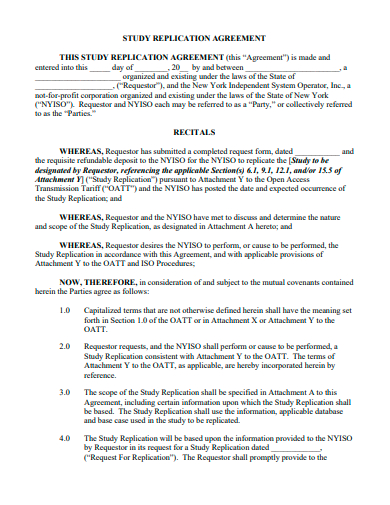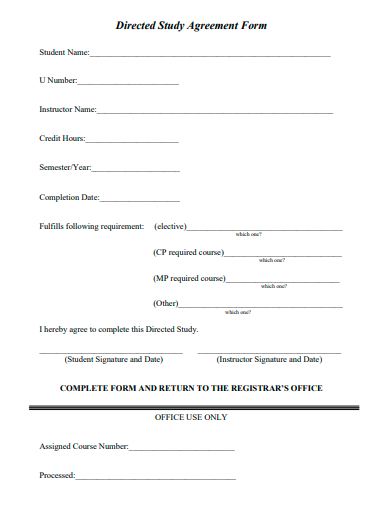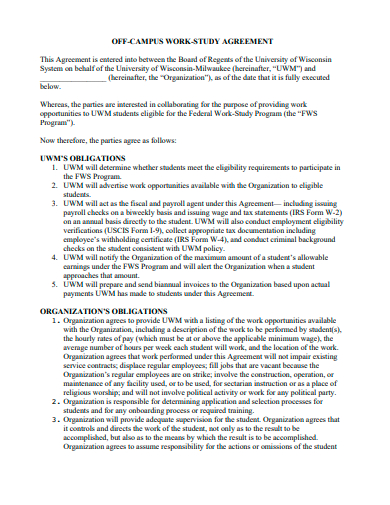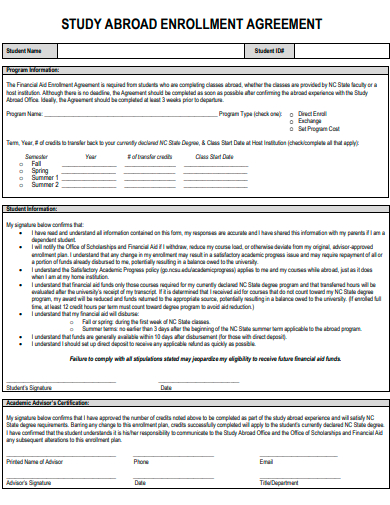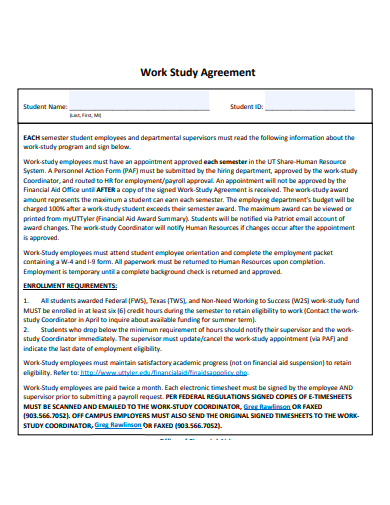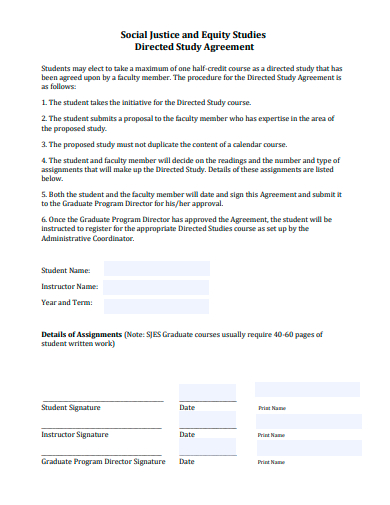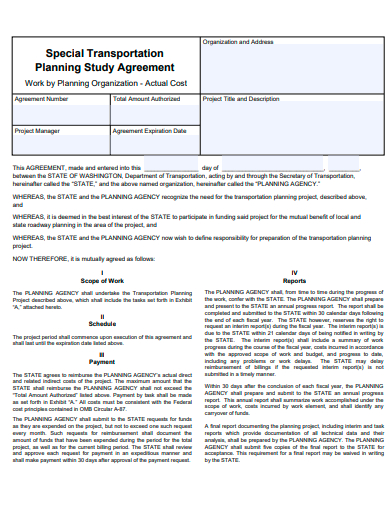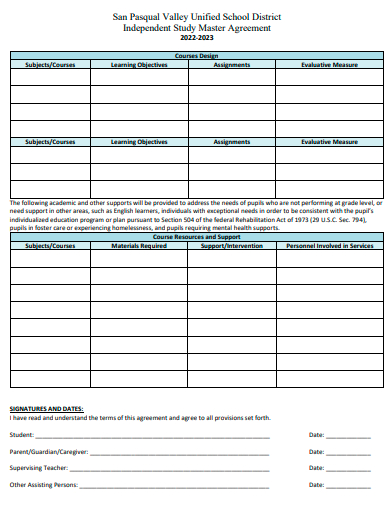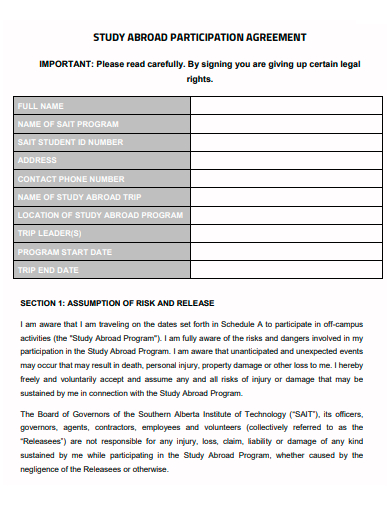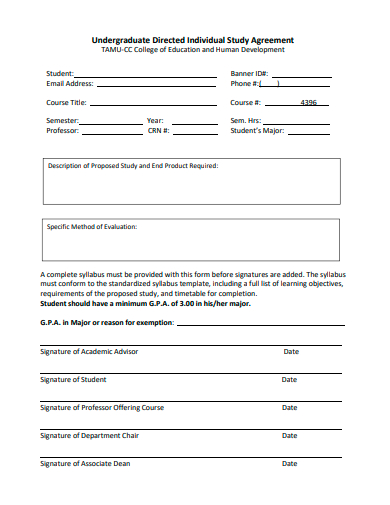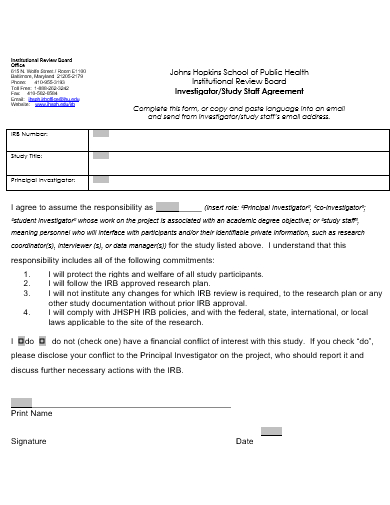Discover the intricacies of efficient research collaboration with our Sample Study Agreement Template. Designed to ensure clarity, protect interests, and foster mutual understanding, this agreement template streamlines the research process. Whether you’re a seasoned researcher or a novice stepping into the academic realm, our keyword-rich agreement paves the way for fruitful partnerships. Dive in and elevate your research projects with a well-structured agreement today!
20+ Study Agreement Samples
1. Clinical Study Agreement Template
2. Sample Study Specific Agreement Template
3. System Impact Study Agreement Template
4. Facility Study Agreement Template
5. Sample Federal Work-Study Agreement Template
6. Interconnection Facilities Study Agreement Template
What is a Study Agreement?
A Study Agreement, at its core, is a formal document that outlines the terms, conditions, responsibilities, and expectations associated with a particular study or research project. Typically used in academic, scientific, and professional settings, this agreement serves as a binding contract between all parties involved—be it researchers, institutions, students, or sponsors. Whether you’re embarking on a short-term research project or a multi-year academic study, understanding the nuances of a Study Agreement can be vital for ensuring the smooth progression and successful completion of the endeavor.
Key Elements of a Study Agreement:
Parties Involved: This section identifies all entities entering into the agreement, such as individuals, institutions, or organizations.
Purpose and Scope: Here, the specific objectives of the study are detailed, including the overarching goals and the methodologies to be used. The scope determines the extent and boundaries of the research.
Duration: The expected start and end dates of the study, along with any potential phases or milestones, are outlined.
Responsibilities: This section delineates the roles and duties of each party, ensuring clarity and accountability. It may cover aspects like data collection, analysis, reporting, and more.
Confidentiality: Given that research often involves sensitive or proprietary information, this clause ensures that all parties maintain the confidentiality of shared data and findings.
Funding and Resources: Details about the budget, funding sources, allocation of resources, and any financial obligations are provided.
Intellectual Property: This is crucial when the research might lead to new inventions, methodologies, or publications. The agreement should specify who owns the intellectual property rights and how any benefits (like royalties or patents) are to be shared.
Termination: Conditions under which the agreement can be terminated prematurely, and the consequences of such an action, are set out.
Dispute Resolution: Given that disagreements might arise, this section provides a predetermined mechanism—like mediation or arbitration—to address and resolve conflicts.
Miscellaneous Provisions: These could include any other specific terms or conditions relevant to the particular study, such as publication rights, ethics approvals, or data storage and retention policies.
7. Sample Independent Study Course Agreement Template
8. Community Service Federal Work Study Agreement Template
9. Sample Study Agreement Template
10. Study Room Agreement Template
11. Study Replication Agreement Template
12. Sample Directed Study Agreement Form Template
Why is a Study Agreement Important?
Clarity and Focus: With a detailed plan and outlined responsibilities, all parties can remain aligned with the study’s objectives, preventing miscommunication and potential conflicts.
Protection of Interests: Whether it’s safeguarding intellectual property or ensuring proper compensation, a Study Agreement shields the interests of all involved.
Accountability: The document enforces a sense of duty, ensuring all parties adhere to their roles and responsibilities.
Legal Safety Net: In case of any disputes, the agreement serves as a reference point, offering legal protection and a structured approach to resolution.
In conclusion, a Study Agreement is not just a mere formality; it is the backbone of any structured research endeavor. It encapsulates the collective vision, providing a roadmap for collaboration and setting the stage for innovation and discovery. If you’re considering embarking on a research project, ensure that a comprehensive Study Agreement is in place—it’s a testament to professionalism, foresight, and a commitment to excellence.
How to Create a Study Agreement
Creating a Study Agreement is a crucial step in ensuring the smooth operation, understanding, and completion of a research project. Such an agreement brings clarity, sets expectations, and mitigates potential misunderstandings. If you’re diving into a new research endeavor and need guidance on constructing a robust Study Agreement, follow these step-by-step instructions:
Define the Purpose and Scope:
Begin by detailing the primary objective of the study. What do you hope to achieve?
Clearly describe the scope, methodologies, and boundaries of the research to prevent scope creep or misunderstandings.
Identify the Parties Involved:
List all entities, individuals, institutions, or organizations that will participate in the study.
Mention their roles, affiliations, and contributions.
Set the Duration:
Specify the expected start and end dates.
If applicable, break the project into phases and list milestones or deliverables for each.
Outline Responsibilities:
Clearly delineate the roles and duties of each party.
This might encompass tasks like data collection, analysis, reporting, supervision, etc.
Address Financial Aspects:
Detail the budget and funding sources.
Specify how resources and funds will be allocated.
Highlight any financial obligations of the parties involved, such as fees or reimbursement protocols.
Discuss Intellectual Property (IP):
Determine who will own the rights to any discoveries, innovations, or publications arising from the study.
Define the distribution of potential profits, royalties, or other benefits.
Decide on publication rights and how findings will be shared.
Incorporate Confidentiality and Data Protection Clauses:
Ensure that all parties understand the importance of confidentiality, especially if the research involves sensitive information.
Include provisions on data storage, access, and potential sharing or publication.
Specify Termination Conditions:
Outline scenarios or conditions under which the agreement can be terminated prematurely.
Mention any potential penalties, refunds, or other consequences of termination.
Include a Dispute Resolution Mechanism:
Address how disagreements will be resolved, whether through mediation, arbitration, or another predefined method.
Determine jurisdiction in case of legal disputes.
Add Miscellaneous Provisions:
Cover any other unique or specific terms relevant to your study, such as ethics approvals, equipment usage, or third-party collaborations.
Review and Consult:
It’s advisable to have the agreement reviewed by legal counsel to ensure its comprehensiveness and compliance with any relevant laws or regulations.
Share the draft with all involved parties for feedback and ensure everyone is on the same page.
Finalize and Sign:
Once all points are agreed upon and the document has been reviewed, gather all parties to sign the agreement.
Consider having the signatures notarized for added authenticity.
In essence, a well-crafted Study Agreement serves as a foundation for research success, protecting the interests of all parties and ensuring a structured path forward. While the process might seem detailed, investing time and effort upfront can save potential hassles, misunderstandings, or disputes down the road.
13. Off Campus Work Study Agreement Template
14. Study Abroad Enrollment Agreement Template
15. Sample Work Study Agreement Template
16. Directed Study Agreement Template
17. Special Transportation Planning Study Agreement Template
18. Independent Study Master Agreement Template
19. Sample Study Abroad Participation Agreement Template
20. Undergraduate Directed Individual Study Agreement Template
21. Study Staff Agreement Template
Why Do We Need a Study Agreement?
In the intricate world of research and collaboration, the Study Agreement stands as a beacon of clarity, security, and understanding. But why is such a document so pivotal? Below we delve into the multiple reasons underscoring the necessity of a Study Agreement in academic, scientific, and professional endeavors.
Clear Communication of Objectives:
A Study Agreement methodically lays out the purpose and objectives of the research. This clarity ensures that all parties involved have a unified understanding of the project’s goals, preventing potential misinterpretations or deviations from the core intent.
Defined Roles and Responsibilities:
Within a research project, multiple parties—ranging from researchers, assistants, institutions, to sponsors—may play varying roles. The Study Agreement spells out the specific responsibilities of each participant, ensuring that duties and expectations are crystal clear, which in turn minimizes the risk of oversight or mismanagement.
Protection of Intellectual Property:
Research often leads to new knowledge, methodologies, or even inventions. A Study Agreement delineates who owns the rights to these discoveries. By clearly defining intellectual property rights, the agreement prevents future disputes over ownership and ensures that contributors receive due recognition or compensation for their innovations.
Financial Transparency:
Research projects often involve monetary transactions, be it in the form of funding, compensation, or resource allocation. The Study Agreement provides a transparent account of all financial aspects, ensuring that there are no ambiguities regarding budgets, payments, or fund utilization.
Ensuring Confidentiality:
Some studies involve sensitive data, proprietary information, or confidential subjects. The agreement contains clauses that bind parties to maintain the secrecy of such information, safeguarding the interests of participants and the integrity of the research.
Legal Safeguard:
In the unfortunate event of misunderstandings or disputes, the Study Agreement serves as a legal reference. It offers a structured mechanism for dispute resolution and can be used as evidence if legal actions become necessary. Having a signed agreement lends a degree of legal protection to all parties involved.
Framework for Ethical Conduct:
Especially in fields like medical or psychological research, ethical considerations are paramount. The Study Agreement can stipulate adherence to certain ethical standards, ensuring that the research is conducted with integrity and respect for all subjects and stakeholders.
Facilitating Collaboration:
Often, research projects are collaborative efforts between different institutions or researchers from diverse backgrounds. The Study Agreement provides a framework that facilitates this collaboration, ensuring that all parties work in harmony, respecting each other’s contributions and boundaries.
Termination and Exit Clauses:
Not all research endeavors proceed as planned. The Study Agreement provides predefined conditions under which the study can be terminated or parties can exit, ensuring that there’s a clear and fair process for concluding the collaboration.
In essence, a Study Agreement is more than just a piece of paper—it’s a testament to the seriousness, professionalism, and foresight of the parties involved. By setting clear guidelines, expectations, and safeguards, it paves the way for research projects to thrive, fostering an environment of trust, mutual respect, and collaborative success.
Related Posts
FREE 10+ Mentoring Agreement Samples In MS Word | Apple Pages | PDF
FREE 10+ Partner Agreement Samples In MS Word | Google Docs | Apple Pages | PDF
FREE 10+ Individual Agreement Samples In MS Word | Google Docs | Apple Pages | PDF
FREE 10+ Strategic Agreement Samples In MS Word | Google Docs | Apple Pages | PDF
FREE 10+ Equity Agreement Samples In MS Word | Google Docs | Apple Pages | PDF
FREE 10+ Producer Agreement Samples in MS Word | Apple Pages | PDF
FREE 10+ Grant Agreement Samples In MS Word | Apple Pages | PDF
FREE 8+ Meeting Agreement Samples in MS Word | Google Docs | Apple Pages | PDF
FREE 10+ Community Agreement Samples In MS Word | Google Docs | PDF
FREE 8+ Real Estate Option Agreement Samples in MS Word | PDF
FREE 10+ Call Option Agreement Samples In MS Word | PDF
FREE 10+ Advertising Agreement Samples In MS Word | Google Docs | Apple Pages | PDF
FREE 10+ Car Agreement Samples In MS Word | Google Docs | Apple Pages | PDF
FREE 10+ Horse Agreement Samples In MS Word | Apple Pages | PDF
FREE 10+ Option Agreement Samples In MS Word | Google Docs | Apple Pages | PDF
